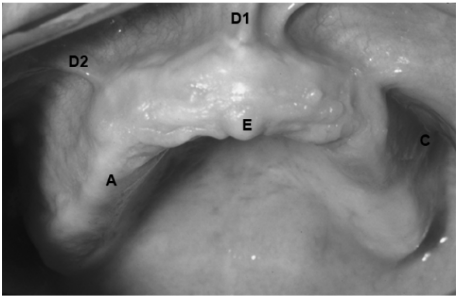Dentures quiz I
1/38
There's no tags or description
Looks like no tags are added yet.
Name | Mastery | Learn | Test | Matching | Spaced |
|---|
No study sessions yet.
39 Terms
rounded/U-shaped
most favorable contour of vault that provides good retention and stability
gradual curve
most favorable contour of soft palate
anterior
the vibrating line is located _____ to the fovea palatinae
posterior palatal seal area
the region at the posterior boundary of the denture that aids in retention by creating a seal over the soft palate.
positive pressure in posterior palatal seal area
aids in preventing denture from dropping in posterior area
true
T/F all mandibular tori should be considered for removal
true
T/F a torus palatinus does not require surgical removal unless it is of suffucient size
2A
classification of mucosa that is THINNER than average
2B
classification of mucosa that is THICKER and more displacable than average
3
classification of mucosa that is EXCESSIVELY DISPLACABLE and possibly requires. surgical corrrection
epulis fissuratum
folds of hyperplastic tissue in the edentulous ridge caused by chronic irritation from dentures.
inflammatory papillary hyperplasia
multiple papillary projections of inflammatory tissue on the palate, often associated with ill-fitting dentures or poor hygiene
Retrognathic
a dental condition characterized by the mandibular arch positioned extensively LINGUAL to maxillary arch, potentially affecting occlusion and denture fit
prognathic
a dental condition characterized by the mandibular arch positioned LABIAL to maxillary arch, potentially affecting occlusion and denture fit
supeiror pharyngeal constrictor
the distal extension of the lingual flange of mandibular denture is limited primarily by the _____ muscle
posterior to vibrating line
where are the fovea palatine most commonly located
true
T/F The incisive papilla is the exiting point of the nasopalatine nerves and vessels, and may require relief in the finished denture base
true
T/F The retromolar pad is a landmark that can be used to determine the occlusal surface of the lower posterior teeth.
true
T/F The hamular notch is a soft area of areolar tissue between the distal surface of the tuberosity and the hamulus; it houses the distolateral termination of the denture base
4
mandible resorbs ___ times faster than the maxilla
larger
mandibular ridge becomes ____ over time
smaller
maxillary ridge becomes ____ over time
true
T/F The support of the orbicularis oris muscle and its attaching
muscles is vital to denture aesthetics
incisive papilla
important landmark for position of maxillary incisors
upward and inward
The direction and inclination of the resorption of the alveolar
process in the upper edentulous jaw is:
downward and outward
The direction and inclination of the resorption of the alveolar
process in the lower jaw is:
true
T/F the posterior most extension of madibular denture should cover the retromolar pads
residual alveolar ridge
what is A

incisive papilla
covers the incisive foramen
hamular notch area
posterior extension of maxillary denture laterally
vibrating line
an imaginary line that separates the movable and immovable parts of the soft palate
approaches crest of ridge
as resorption continues what may happen to mental foramen
lateral pterygoid
The ____ muscle has no direct effect on denture area
U-shaped
ridge shape most favorable for perfecting a good border seal
mylohyoid ridge
The ____ is located on the lingual aspect of the body of the mandible in the molar region
true
T/F a forward tongue position is more favorable in retention of mandibular denture
type 3
what type of tissue displacement would warrant surgical reduction prior to denture fabrication
retention
the ability of a denture to resist movement away from the underlying tissues during function
stability
The ability of a denture to maintain its position and resist LATERAL movement during function